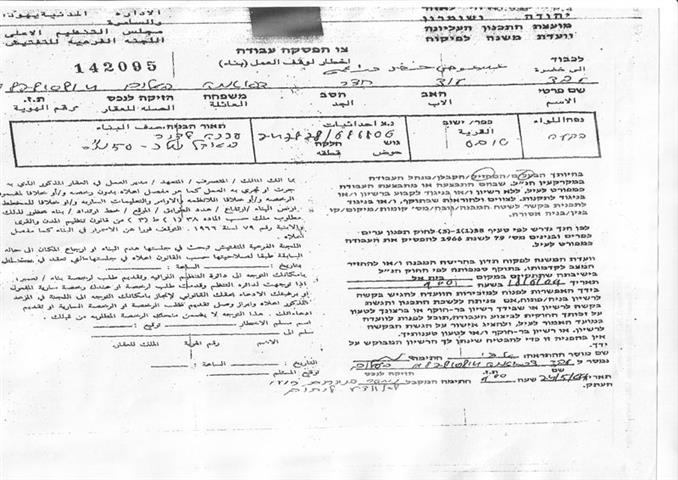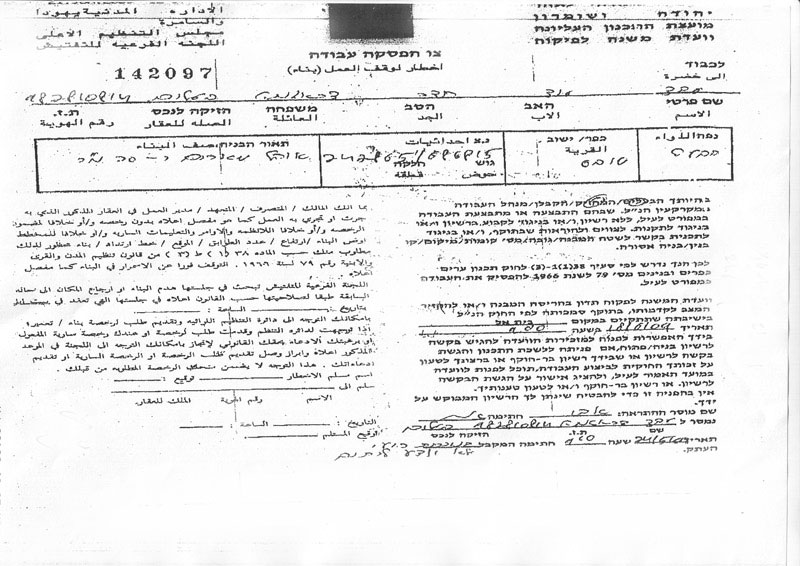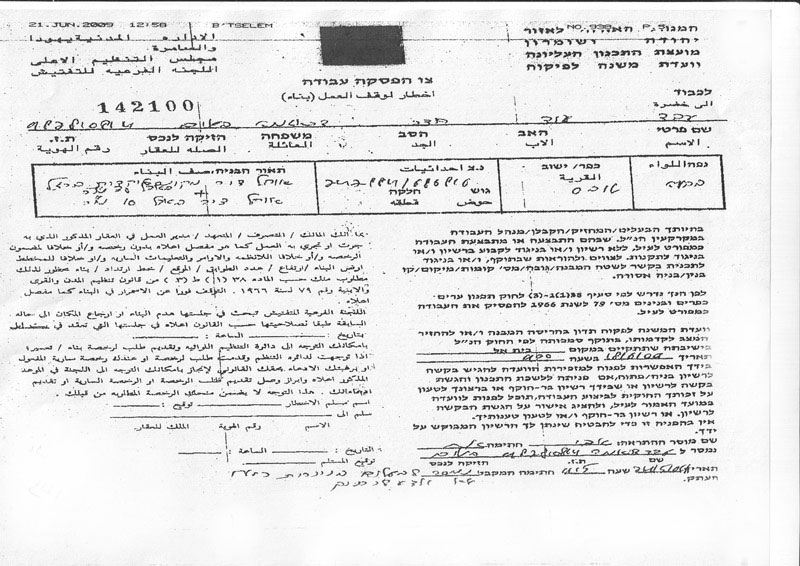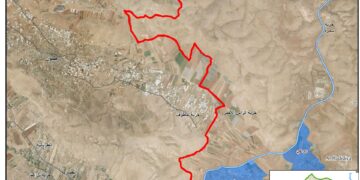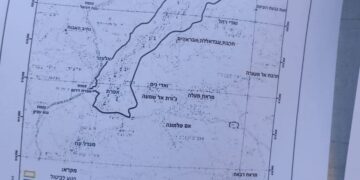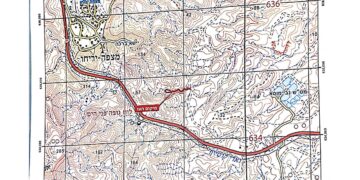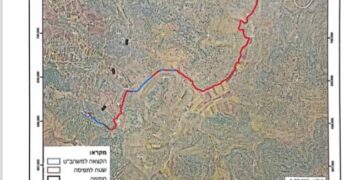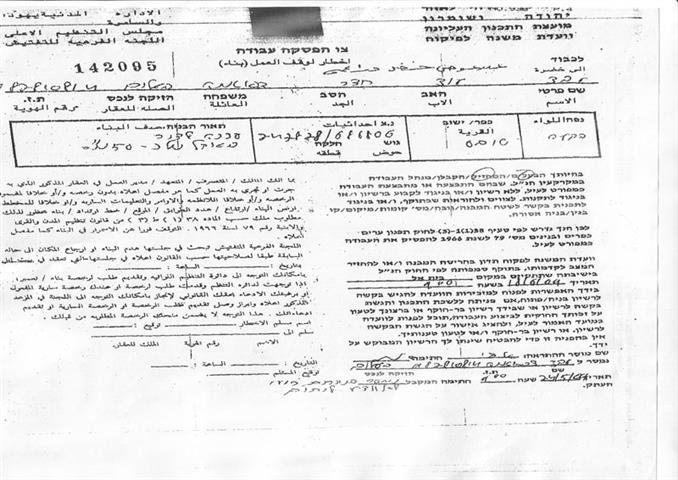The Israeli occupation authorities issued four halt of construction notifications against four animal barracks in Wadi Al Maleh area in Tubas district of northern Ghor region under the pretext un-licensing. The notifications were issued and handed over to Palestinian owners by the higher planning council of the so-called Israeli civil administration in the West Bank.
See photos 1+2+3+4: copies of the notifications
The notifications were handed over on Sunday, 21 of June, 2009, three days after the end of the objection period which expired on 18 of June, 2009. This clearly shows the Israeli carelessness for issues related to the local people in that area, particularly, the construction issues and, at the same time, reflects the Israeli determination to evict the indigenous community out of the area for allegedly being a closed military zone.
Table 1: Halt of construction notifications by owner's name, type of construction and area
|
# |
Owner's name |
Type of construction |
Area M2 |
|
1 |
Abed Awad Khader Daraghma |
Animal barrack |
48 |
|
2 |
Na'im Jamil Daraghma |
Animal barrack |
24 |
|
3 |
Mohammed Nimer Theeb |
Animal barrack |
36 |
|
4 |
Thiyab Abed Awad Daraghma |
Animal barrack |
20 |
|
Total |
4 barracks |
128 |
|
Source: LRC field work
Photo 5: notified animal barracks
Sine the beginning of May, 2009, the Israeli occupation authorities demolished 28 structures under the same pretext in the areas of ar Ras Al Ahmar, Al Hadidiya, Tamun and Ein Al Hilwa of Wadi Al Maleh, while, another 35 structures have been notified for demolition or halt of construction.
Settlement activity in Wadi Al Maleh
Since the occupation of the Ghor ( Jordan valley) region in 1967 war, successive Israeli governments have been exerting utmost efforts to build as many colonies as possible in this area for strategic and economic reasons. On one hand, the Israelis consider it as the eastern security built, and, on the other hand, it has a unique climate suitable for tropical agriculture supported by rich soil and abundance of water. For all these reasons, about 29 colonies have been established on its soil, most of which are kibbutz villages producing variety of vegetations and animal products. These colonies are now settled by at least 9000 settlers occupying an area of about 75000 dunums ( 1 dunum = 1000 M2).
Table 2: Israeli settlement in Wadi Al Maleh by Colony name, Date of establishment, population and area#
|
|
Colony name |
Date of establishment |
# of settlers at the end of 2007 |
Municipal area Dunum |
Built up area Dunum |
|
1 |
Sal'it |
1977 |
474 |
1377 |
256 |
|
2 |
Mehola |
1968 |
357 |
615 |
190 |
|
3 |
Mekhora |
1973 |
112 |
132 |
550 |
|
4 |
Rotem |
1984 |
24* |
16 |
123 |
|
5 |
Maskiyyot |
1987 |
507* |
Non Available |
Non Available |
|
5 |
Total |
1474 |
2140 |
1119 |
|
* By the end of 2003
* By the end of 2000
Source: Foundation for Middle East Peace: Washington. See Map 1
These colonies are expanding on daily basis at the expense of Palestinian land owners in the region. Israeli colonists are, also, carrying out a daily harassment campaign to the degree that their acts have become a true challenge for Palestinian residents there. These colonists are often called “Colony Youth” who would usually wander between Palestinian farms and herding fields in the region with the aim of physically attacking the unarmed Palestinians and damaging their property.
House demolition in light of human rights, international covenants and treaties
Israel as an occupier should abide by the international human rights treaties to which it is a state party including: The International Covenant on Economic, Social and Cultural Rights (ICESCR) and the International Convention on the Elimination of All Forms of Racial Discrimination,. As an occupier Israel should also abide by the international humanitarian law including: The Hague Regulations and the Forth Geneva Convention. The halt of construction notifications Wadi Al Maleh area of Tubas district is a violation of these rights and covenants. Israel should be held accountable for its acts in occupied Palestinian Territory; should comply with the international legitimacy, laws treaties and United Nations' resolutions; and Israel's long time apathy of the international community's wills must come to an end.
Following is a synopsis of Articles within these covenants, conventions and laws that address the issue of house demolitions and forced evictions under these articles:
International Covenant on Economic, Social and Cultural Rights
-
Article 11 (1): 'The States Parties to the present Covenant recognize the right of everyone to an adequate standard of living for himself and his family, including adequate food, clothing and housing, and to the continuous improvement of living conditions.
International Convention on the Elimination of All Forms of Racial Discrimination (1965)
-
Article 5: 'States' Parties undertake to prohibit and eliminate racial discrimination in all of its forms and to guarantee the right of everyone, without distinction as to race, color, or national or ethnic origin, to equality before the law, notably in the enjoyment of the following rights: … (e) in particular … (iii) the right to housing.
Universal declaration of human rights, Article 17:
1. 'Everyone has the right to own property alone as well as in association with others.
2. 'No one shall be arbitrarily deprived of his property.
Article 25:
1. 'Everyone has the right to a standard of living adequate for the health and well-being of himself and of his family, including food, clothing, housing and medical care and necessary social services, and the right to security in the event of unemployment, sickness, disability, widowhood, old age or other lack of livelihood in circumstances beyond his control.
The Fourth Geneva Convention
-
Article 53: 'Any destruction by the Occupying Power of real or personal property belonging individually or collectively to private persons, or to the State, or to other public authorities, or to social or cooperative organizations, is prohibited, except where such destruction is rendered absolutely necessary by military operations.
-
Article 47: 'Protected persons who are in occupied territory shall not be deprived, in any case or in any manner whatsoever, of the benefits of the present Convention by any change introduced as the result of the occupation of a territory, into the institutions or government of the said territory, nor by any agreement concluded between the authorities of the occupied territory and the Occupying power, nor by any annexation by the latter of the whole or part of the occupied territory.
-
Article 147: 'Grave breaches to which the preceding Article relates shall be those involving any of the following acts … extensive destruction and appropriation of property, not justified by military necessity and carried out unlawfully and wantonly.
Hague Regulations 1907
-
Section II Article 23: 'it is especially forbidden- to destroy or seize the enemy's property, unless such destruction or seizure be imperatively demanded by the necessities of war.
-
Section III Article 46: 'Family honor and rights, the lives of persons, and private property, as well as religious convictions and practice must be respected. Private property cannot be confiscated.
Prepared by:
The Land Research Center
LRC


